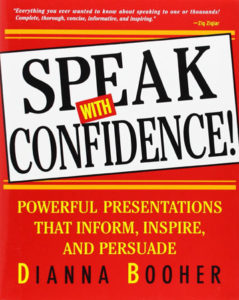


(Forbes first published my article here.)
Now that people are living longer, we’re hearing pundits talk about a 50- or 60-year career becoming commonplace. You might work as a systems analyst, an auditor, or an attorney for 20 or 30 years, and then change to an entirely different field.
Having earned my living from professional speaking for four decades now, I frequently have people contacting me about how to get started in the speaking business—either recent college graduates or seasoned CEOs after their retirement from the C-suite. My answer: It’s really no different than becoming an expert in any field.
Yes, the life of a speaker, author, trainer, or consultant can seem glamourous: Exotic travel around the world. Staying in ritzy hotels with every creature comfort. Eating every meal in fine-dining restaurants. Performing “only” an hour a day on stage. These benefits definitely have a strong pull toward the platform.
But getting good enough to earn a great living from the business may mean more work that you anticipate—but less work if you follow a proven formula. The following steps have worked for me and many other colleagues who’ve made a great living for decades as a content creator (speaking, writing):
Your first and easiest step is to read all that’s available on your topic. Interview experts, asking them to contribute ideas and comments as you write articles and blogs presenting expert views on your topic. Then once your name becomes associated with the “round-up” articles of expert opinion, you’ve added to your education by gathering diverse opinions.
Next step: Begin to synthesize and analyze what you’ve read and learned from experience. Find ways to apply that knowledge to specific challenges in organizations or opportunities of your own making: What new applications of the ideas or facts do you see? Where does your own experience agree or disagree with opinions offered by others? What can you add to the body of knowledge?
Sooner than you realize, you’ll become known as one of the experts.
Once you’ve developed your own theories, ideas, and illustrations, practice what you preach. That is, put your ideas to work in specific, practical situations. Find opportunities to use what you know and to measure the results.
For example, when I started consulting about business and technical writing, I presented the concepts in corporations, and led clients to measure the results in several ways:
1) Increased productivity of workers who write for a living (engineering reports, audit reports, marketing proposals, feasibility proposals, sales proposals, and so forth)
2) Fewer accidents reported because of clearer instructions
3) Savings in executive reading time when documents came to them organized appropriately with the right details to help them make decisions
After you get the content and theories down pat, get good at fine-tuning your presentations or training. Just because someone has become an expert doesn’t mean he or she knows how best to pass on their knowledge or help others learn how to perform well.
Your mission at this stage is to develop mastery in presenting your ideas to others. Developing unique illustrations, analogies, metaphors. Pacing your presentation. Mastering the necessary technology you’ll use to present your work. Becoming a great storyteller. Adding humor—yes, even to serious topics.
If you have to, speak for free at first to hone your material. Your local chamber of commerce, Kiwanis Club, Lions Club, the local credit union association—they’re always begging for free speakers at their monthly meetings.
If you don’t discover your own weaknesses for yourself, a few audience members will be willing to tell you. Listen. Learn what you don’t know and can’t do well.
In starting to speak professionally, my husband frequently said to me, “Great content. But you talk too fast. People don’t have time to absorb it all.”
My initial, resistant reaction: “Well that may be your opinion, but my audience evaluations are great—most clients tell me they’re the highest ratings they’ve ever received.”
And then I heard a couple of audio recordings of speeches I’d delivered. I sounded like Donald Duck! That’s when I contacted speech coach Max Dixon for help to slow down. To my surprise, we spent an entire day on one 2-minute story from my keynote. When he finished with me, I knew both how and why I had to slow down!
Turning those weaknesses into strengths can catapult you to a new level in your career.
As soon as possible, spring out of the “free speech” category. Our national speaking association repeats this mantra often to its new members: “Speaking for free only gets you other opportunities to speak for free.” In my experience, that’s very true.
Having said that, you’ll find exceptions: You may want to speak for free in front of an important audience that can hire you for other paid engagements—or that can buy your other high-ticket products and services like consulting or $10,000 seats at a summit or mastermind session.
But largely, once you set your speaking fees, you automatically select your competitors—those within the same fee range. Make sure that positions you positively, not negatively.
Personal referrals are powerful. Remind satisfied clients to tell colleagues within their own company and in the wider industry. Your reputation will spread like wildfire.
In my own case, here’s how the network worked for me in the oil-and-gas industry the first two years in business: Pennzoil referred me to United Gas Pipeline, which referred me to Superior Oil, which referred me to Conoco (now Conoco-Phillips), which referred me to Tenneco, which referred me to Shell Oil, which referred me to Exxon (now Exxon Mobil), which referred me to Chevron, which referred me to British Petroleum, which referred me to Chesapeake, which referred me to Devon Energy.
I could trace the same network through the high-tech industry: Hewlett Packard, then Compaq, then IBM, then Dell, then Microsoft, and so on. Within two years, I had to hire other trainers and speakers to help me meet the incoming requests.
It’s all about doing a good job and then asking happy clients to pass your name along. Clients love to help you; it underscores their good judgment in hiring you first!
Sooner or later, your reputation will grow to the end of your networks. That’s when you leverage media to expand your influence and reputation. Writing a great book (or books) in your field presents an open door to media coverage. When my first book came out, my publishers (hardcover publisher Facts on File and paperback released by HarperCollins) paid for an extensive media tour, which led to many more speaking and training engagements.
That’s the way it has worked with each new book—more media coverage leads to more business.
Unfortunately, many great speakers have gone out of business because they never learned the business side of speaking and writing: When to hire staff so they can spend time on only what they do best. How to hire suitable staff. How to establish productive processes. How to determine proper pricing. How to manage cashflow. When and how much of their profits to reinvest in building their business. How to “pace their spending” so they can survive and even thrive in dot.com bubbles that burst and during tough economic times like the recent pandemic.
You can do all these things well and still feel like a personal failure because you’re not living the life you want, . . . in relationships you enjoy, . . . based on values you hold dear.
I recently had a prospective client resist my speaking fee with this comment: “Your charge THAT for just a 30-minute talk? Why, I think even I could talk half an hour on communication!”
Maybe he can—but that’s not all there is to the picture. Like physicians who spend 9-10 years in training to do a 60-minute operation, speakers don’t get paid solely for their 45-minutes on stage. They get paid for all that prepares them to perform well.
In fact, I’ve heard speaker-friends say, “I speak for free. You’re paying me to deal with the stress of travel, . . . for loneliness in being away from my family and friends for days at a time, . . . for having to miss key events in my community or family life.”
These considerations are part of the decision to become a professional speaker. If you can handle these, go for it!
Wrap-up: Understand that it’s not all publicity, performance, and applause. If you work at it, you can serve others well with a meaningful message, enjoy the glamorous benefits, and earn a great living as a professional speaker. Many do!
Learn more ways to improve your presentation skills with Speak with Confidence!: Powerful Presentations That Inform, Inspire, and Persuade.
